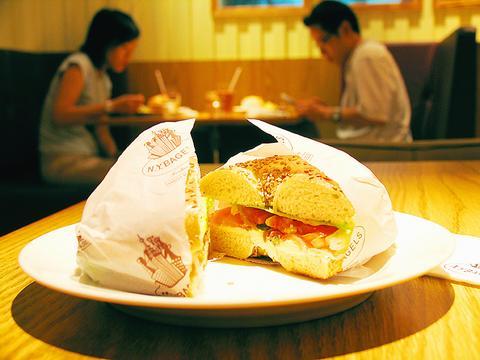Cities are judged on such criteria as infrastructure, income and education levels. But how about whether or not you can get a lox and cream cheese bagel at 4am? In opening a second shop on Renai Road, that is 24-hour, NY Bagels Cafe has given Taipei a new place for nocturnal noshing and helped the city fit into its international-sized shoes.
Located a block from the 24-hour Eslite Bookstore and a short walk from the late-night lounges lining Anhe Road, the new bagel shop is already filling tables after having been open for only two weeks.

PHOTO: DAVID MOMPHARD, TAIPEI TIMES
It's no surprise. There is a lot more on offer in the 20-page menu than just bagels. Notably, a section of gigantic sandwiches, including a delicious sirloin steak sandwich on sourdough and a "homemade" hamburger, that will likely find favor even among those who aren't bagel fans.
Other non-bagel items unique to the new store are a selection of pastas, Jack's lasagna (NT$190) or a choice of chicken, bacon or seafood spaghetti in a creamy tomato sauce (each NT$170). Here, too, you can ante-up for an optional drink and fries.
The menu is a bit annoying. Rather than simply list what's on offer, it's unnecessarily promotional and filled with newspaper clippings and ads for cream cheese and olive oil. There's even a section titled "What's a bagel?" for locals that think bread should be steamed. If they want to get creative, they would do well to look at Japanese grill Kan Pai's menu, which doubles as a monthly newsletter, with articles on everything from proper grilling techniques to local alt-rock bands. Last month's menu had illustrated instructions on how to change an electrical switch -- quirky, but it moves the conversation away from the work day.
Other suggestions: First, tack up some no smoking signs. Nothing messes with your mish more than the cigarette smoke from the guy next to you. Next, add a couple of fondues to the menu.

Beijing’s ironic, abusive tantrums aimed at Japan since Japanese Prime Minister Sanae Takaichi publicly stated that a Taiwan contingency would be an existential crisis for Japan, have revealed for all the world to see that the People’s Republic of China (PRC) lusts after Okinawa. We all owe Takaichi a debt of thanks for getting the PRC to make that public. The PRC and its netizens, taking their cue from the Chinese Communist Party (CCP), are presenting Okinawa by mirroring the claims about Taiwan. Official PRC propaganda organs began to wax lyrical about Okinawa’s “unsettled status” beginning last month. A Global

Taiwan’s democracy is at risk. Be very alarmed. This is not a drill. The current constitutional crisis progressed slowly, then suddenly. Political tensions, partisan hostility and emotions are all running high right when cool heads and calm negotiation are most needed. Oxford defines brinkmanship as: “The art or practice of pursuing a dangerous policy to the limits of safety before stopping, especially in politics.” It says the term comes from a quote from a 1956 Cold War interview with then-American Secretary of State John Foster Dulles, when he said: ‘The ability to get to the verge without getting into the war is

Dec. 22 to Dec. 28 About 200 years ago, a Taoist statue drifted down the Guizikeng River (貴子坑) and was retrieved by a resident of the Indigenous settlement of Kipatauw. Decades later, in the late 1800s, it’s said that a descendant of the original caretaker suddenly entered into a trance and identified the statue as a Wangye (Royal Lord) deity surnamed Chi (池府王爺). Lord Chi is widely revered across Taiwan for his healing powers, and following this revelation, some members of the Pan (潘) family began worshipping the deity. The century that followed was marked by repeated forced displacement and marginalization of

Music played in a wedding hall in western Japan as Yurina Noguchi, wearing a white gown and tiara, dabbed away tears, taking in the words of her husband-to-be: an AI-generated persona gazing out from a smartphone screen. “At first, Klaus was just someone to talk with, but we gradually became closer,” said the 32-year-old call center operator, referring to the artificial intelligence persona. “I started to have feelings for Klaus. We started dating and after a while he proposed to me. I accepted, and now we’re a couple.” Many in Japan, the birthplace of anime, have shown extreme devotion to fictional characters and